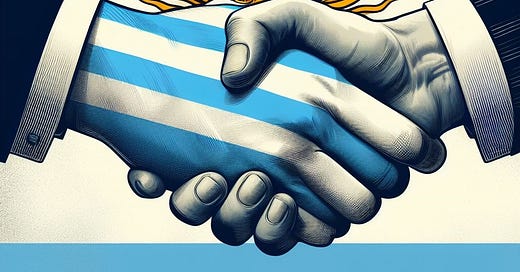After Massa's surprising election result, Milei forges unexpected alliances
Far-right Milei allies with his former rival after coming second in Argentina's elections
This week’s feature is by Argentinian journalist Martina Jaureguy
The Argentine political scenario was completely opened this week and polls were wrong again.. After losing last Sunday's general elections, the far-right liberal Javier Milei is seeking to forge alliances with those he treated as enemies only a week before. The result? A divided opposition, which is trying to reorganize itself in view of the ballot on November 19.
Center-left Peronist candidate Sergio Massa — current Minister of Economy — won Argentina's general elections on Sunday with 36.6% of the votes. Milei, who had won the primaries, came second with 29.9%. The numbers were not enough for any of them to win in the first round.
The unexpected result led to a series of negotiations between Milei and members of the country's largest opposition coalition, the right-wing Juntos por el Cambio (JxC)— a re-shuffling that is causing serious rifts between the parties that make up the political alliance. Perhaps most shocking was the "mutual forgiveness" between Milei and his former opponent Patricia Bullrich, who came in third place, after months of escalating insults and vitriol exchanged between them before the election.
"I don't have any way to explain what happened this week," joked political scientist Lara Goyburu in an interview with Pirate Wire Services. Despite the joke, it expresses a deeper reality: Argentine politics can be unpredictable, and sometimes even unintelligible.
On Sunday night, after the announcement of the preliminary results, Massa expressed confidence at his chances in the second round of elections and promised to create a government of national unity with other Argentine parties. Massa cruised to victory promising significant increases in government spending on social programs, despite the administration he represents battling a significant economic crisis his government is going through.
Cumulative inflation between September 2022 and the same month of 2023 exceeded 138%. Massa took office as Minister of Economy in August last year, promising to steward the country amidst problems that have their roots in policies much older than his current term in office.
Milei, for his part, rushed to seek the support of JxC and its voters.
The opposition in crisis
The 72 hours following the election were chaotic. For the opposition, "Massa's unexpected victory was like an earthquake," political scientist Mariano Fraschini told PWS. Secret midnight meetings between Milei, Bullrich and former president Mauricio Macri on Tuesday generated great discontent among the rest of the JxC members who refuse to form an alliance with the far-right candidate.
"I had a talk with Milei and we forgave each other," Bullrich said at a press conference, in response to a question posed by the writer of this article. Why did they apologize to each other? Just a week ago Bullrich said that Milei's proposals described in the last newsletter are "dangerous' ' and "bad'. Milei, throughout the election campaign, repeatedly accused Bullrich of being a “terrorist” even going so far as to claim she placed bombs in kindergartens in the 1970s, allegedly as part of the guerrilla group Montoneros. Bullrich denied the accusations and even sued Milei for slander and libel in early October.
On Wednesday, after announcing her reconciliation with the liberal candidate, Bullrich said she would drop the slander charges. That evening, they embraced in a live television appearance, visibly uncomfortable.
New Alliance, new positions
Mayor Buenos Aires and failed pre-candidate in the presidential primaries, Horacio Rodríguez Larreta, who is a member of Bullrich's alliance, said in a press conference that he did not know anything about the night meeting between Bullrich, Macri and Milei. Upset with the unilateral decision of his colleagues, he said that he does not support either of the two candidates who remain.
Other member parties of JxC took a more neutral position in view of the second round. Members center-right coalition UCR, such as the governor of the province of Jujuy, Gerardo Morales, were shocked and outraged by Bullrich's decision.
"Macri is happy, this is what he wanted from the beginning— to fuck with Juntos por el Cambio, to fuck with Patricia and to end up joining Milei", he said in a press conference. Most of JxC's governors are from the UCR, making it a key party for the coalition.
More conservative and combative sectors positioned themselves on Bullrich's side. Operatives from the Republican Proposal (PRO) backed the new alliance, saying it’s the only way to beat Peronism and, more specifically, Kirchnerism, the political tradition of Néstor Kirchner and the current vice-president Cristina Fernández— whom they blame for Argentina’s economic crisis.
So What happens next?
During the last eight years, in Argentine politics, the coalition formed by Massa anUnión por la Patria, and JxC have been the principal opposition parties. Now, there may be a formal breakup of JxC, so the scenario may be divided into three coalitions all opposed to each other, warned Fraschini.
"JxC is in a process of reconfiguration of its alliance," Fraschini affirmed. "We could say that two poles are going to remain: one where La Libertad Avanza [Milei's coalition] is going to be joined by leaders of the hardest right-wing sector of the PRO; and the sector of the 'doves' of the PRO, led by Rodríguez Larreta, is going to ally with the UCR and the Civic Coalition in a configuration that may have a new name".
For Goyburu, "the break in the opposition was already given on Wednesday", although it has not been formalized as such. "I think there are leaders who cannot return to JxC, if it still exists".
But how will this new infighting affect Massa and Milei?
"The more division there is in the opposition camp, the better it is going to be for the government, and the more difficult the road is going to be for Milei," Fraschini said. "Milei expected another result in the first round, he is not consolidating a new alliance, and it is beginning to be observed that he is altering from the personal and from the political point of view".
Thursday night, Milei gave an interview with news channel A24 in which he was visibly upset and erratic. "While [those who criticize me] look at the lady through the Internet, I am in the middle of her sheets," he said, using a, well, someone colorful and sexual metaphor to question people who criticize him "from behind a computer”.
The interview created significant controversy on social media.
"I believe that if the economic and social conditions remain stable and the opposition continues with this divisive logic, the result is a bit of a foregone conclusion," Fraschini added. "I don't have the feeling that the [current] government can lose the election."
Goyburu avoided predictions regarding election results, saying only that Milei has the opportunity to change the discourse on objections from within his coalition. On November 19 election they vote boils down to pro-Kirchnerism or anti-Kirchnerism, he explained. "If this is the choice, [this strategy] may solidify support among hard-liners, but it will not win Milei new voters."
Goyburu says Massa can turn the public debate towards his proposals for the recovery of the economy. "The country is going through the consequences of a quite important economic crisis. What matters to the citizen today is a solution to the economic problems," said the expert. "Today the election is played between those who did not go to vote [in the general elections], or who voted blank."
There are still a little more than three weeks to go before the second round on November 19. In Argentinian politics, a month is an eternity— one where anything is possible.
The Big Headlines in LATAM
In Venezuela, right-wing candidate María Corina Machado swept informal presidential primary elections with over 90% of the vote, and will be put forth as the candidate in 2024. But Machado was banned from holding office by Maduro’s ruling party PSUV in a retroactive court decision in July.
Last week the United States eased international sanctions imposed on Venezuela by the Trump administration in 2019 in return for promises that elections next year will be free and transparent. The U.S. has since threatened to reimpose them if Machada is not allowed to run.
The opposition in Venezuela has long been fragmented, and many sectors have boycotted past elections. but Machada’s overwhelming victory in the primaries represents a consolidation of interest groups that has historically suffered from considerable infighting.
PSUV has not announced their presidential candidate, but Maduro, who has held power since 2014, is widely expected to run.
An unexpected Hurricane in the state of Guerrero in Mexico that made landfall on Wednesday left at least 27 people dead. Acapulco was especially hard hit. Washed-out roads prevented Mexican president Andrés Manuel López Obrador from visiting the region by car. Nearly one-third of homes in the region still had no power as of Friday morning.
Ship’s Business
We’re expanding into new social media networks in an attempt to get off of Twitter, which since the takeover by Lord Elmo, is proving not only useless for our journalism work, but also a deeply unhealthy place to hang out. As part of those efforts, we’ve launched an Instagram account! Check us out! We’re team follow-back!
Spanish Word of the Week
Since we’re on the topic of Argentina, we have to go with some Argentinian slang.
boludo/a: the term boludo/a can both be an insult by calling someone an idiot; a term of endearment used among friends
Literally means “person who has large balls”.
As arguably the most important word in the Argentine dialect of Spanish, boludo/a is loaded with humorous versatility, and the proper usage of this word goes a long way.
The main rule for using boludo is to only use it around individuals have established a kind of bantering familiarity— or someone you want to insult.
We’re sure Bullrich referred to Milei as boludo countless times in recent months before their public truce.
Thanks for reading, friends! As always, talk soon! Hasta pronto piratas!








That's populism and sellout politics. I hate you, but forgive you if you promise me the position I want. That's the second phase. The first is the funders pulling strings.